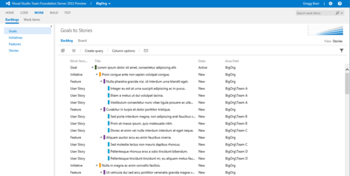The next release of the Microsoft Team Foundation Server (TFS), an application for managing software development, has been designed to bring agile development practices to larger, multi-team projects.

A preview of Team Foundation Server 2013
"The problem of scaling up agile in enterprises is a big one that everyone faces," said Brian Harry, a Microsoft technical fellow working as the TFS product unit manager. "Over the last ten years, we've had this rush of everyone trying to get to agile. I think we're just hitting the peak of disillusionment, where more organizations have tried to make agile work, but it is difficult to get it to scale to an enterprise. We think that is something we can help with."
TFS is software for managing the collaborative application development lifecycle, including requirements management, project management, configuration management, testing, and deployment. The company announced the next release of TFS 2013 at the Microsoft TechEd conference, being held this week in New Orleans. Microsoft will release a preview of the updated software on June 26, for its Build developer conference. It will release the full production-ready version by year's end. The new features will be phased into the Team Foundation Service (a Microsoft hosted version of TFS) over the course of this year.
Agile development has emerged as a popular approach to software development, one designed to speed the development process with rapid iterations and immediate customer feedback. Agile can pose some challenges, however, with larger enterprise-focused software development projects, Harry noted. "Everyone invents their own way of rolling up these small agile teams in a way to deliver on enterprise-scale problems," he said.
With this release, TFS has been designed to manage larger multi-team projects. The earlier TFS version focused on collecting metrics about how an individual team is progressing; the new version can track the progress of multiple teams and provide the collected metrics, along with drill-down details, to project managers. Each team can still use the software to manage the reporting of their own backlogs, using Scrum or other workload management techniques of their choice.
"We provide a better way to track how multiple teams are contributing to the same initiative. This gives you the ability to have a large project-wide view of what you are trying to deliver and then break that down into what many teams are doing," Harry said.
The new software will also offer a new collaboration space where participants in a project can get a quick glance of all the news around the development of the project, which unfolds as a live stream. Participants can add comments in a chat mode and the stream also includes events reported from the software, such as code check-ins, build results, and other third-party events that can be added by the administrator through the extensible framework.
TFS will also make use of a new acquisition announced Monday by Microsoft, of InCycle Software's InRelease business unit. This software will help organizations with their Devops practices, in which the development teams work more closely with the operation teams to debug and improve in-house software more quickly. With agile practices, "development teams could crank out code faster than the ops teams could consume it," Harvey said. InCycle's software provides a way to manage a software development workflow in a way that spans both development and operations.
"This helps with impedance mismatch" between development adn operations, Harvey said. "It is a very clear way of documenting what the process is and then automating that process."
TFS 2013 will also include a fully supported copy of Git, a popular distributed source code management application. The company plans to reveal more features in TFS 2013 at the Build conference, Harry said.





